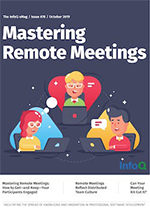SPONSOR AD  What is identity management and when should you build vs buy? Download this free comprehensive 22-page guide to learn about modern identity for different use cases and whether your current solution is hindering growth. Download now. |
 This eMag brings together the complete set of reports from the last 12 months and as such represents various points in time. We hope that this format provides InfoQ readers, from developers to CTOs, with a concise summary of the professional software landscape. We encourage you to explore these technologies for yourselves. (eMag) |
 Today, on The InfoQ Podcast, Wes Reisz talks with Gunnar Morling, a software engineer at Red Hat who leads the Debezium project. Debezium is an open-source distributed platform for change data capture (CDC). (Podcast) |
 In this podcast Shane Hastie, Lead Editor for Culture & Methods, spoke to Kevin Callahan about positive organisational design and organisations as complex systems. (Podcast) |
| |
| The Stanford Human-Centered Artificial Intelligence Institute published its AI Index 2019 Report. The 2019 report tracks three times the number of datasets as the previous year's report, and contains nearly 300 pages of data and graphs related to several aspects of AI, including research, technical performance, education, and societal considerations. (News) |
| |
TOP DevOps NEWS HEADLINES |
-
-
|
 Olga Kundzich and Richard Francois cover JPMorgan Chase’s journey to transition to Spinnaker, demoing a configurable Spinnaker pipeline template that manages all the deployment processes. (Presentation) |
 Nisha Kumar talks about Tern, an open source tool for inspecting container images for OSS compliance. She provides examples of how enterprises can evaluate container images, Dockerfiles, and container supply chains using Tern, even for the impossible situations. She talks about the pitfalls of long advocated best practices for building and reusing container images for the software supply chain. (Presentation with transcript included)
The next QCon is QCon London, March 2-4, 2020. Join us! |
SPONSOR AD  Discover the common challenges found when operating distributed cloud-native environments and how to approach them: - Performance and reliability
- Tracing and call analysis
- Bottlenecks and errors
Learn More. |
| |
| |
TOP Development NEWS HEADLINES |
-
|
 Developer, Advocate! is a set of interviews with prominent technologists, covering what drives their interest and enthusiasm in the industry. The brevity of each interview provides direct information and insight that can be read separately at any time, in any order, enabling those with busy schedules to read, put down, and repeat. (Article) |
 Sal Freudenberg and Chris Adams discuss the climate, its impact on the world and the role of technology in preventing global warming. (Presentation) |
| |
 Groovy 3 adds several new features similar to equivalents in Java, including the enhanced for loop, try-with-resources and lambda expressions. (Article) |
 Sam Brannen presents new features in JUnit 5: parallel test execution, temporary directories, custom display name generators, method ordering, timeouts, the Test Kit, and new extension APIs. (Presentation) |
 Phil Clay shows code examples of blocking problems and solutions when using Project Reactor, as well as a live demo with BlockHound. (Presentation) |
 Jennifer Lee highlights an advantage to Spring Boot: it's easy to learn, easy to master, and easy to teach. (Presentation) |
| |
TOP .NET NEWS HEADLINES |
-
-
|
| The module initializer proposal has been promoted to C# 9 candidacy. This would act like a static constructor in C#, but rather than applying to one class it applies to the entire assembly. (News) |
| |
TOP Web Development NEWS HEADLINES |
-
|
 Functional UI is a set of techniques which rely heavily on functional programming to develop user interface applications. While deceptively simple, functional UI techniques are surprisingly powerful. Functional UI directly reflects the application's specifications, allows developers to unit-test user scenarios, and UI frameworks become mere libraries. Framework-free at last! (Article) |
| |
 Ben Sigelman talks about "Deep Systems", their common properties and re-introduces the fundamentals of control theory from the 1960s, including the original conceptualizations of Observability & Controllability. He uses examples from Google & other companies to illustrate how deep systems have damaged people's ability to observe software, and what needs to be done in order to regain control. (Presentation with transcript included) |
 Anvita Pandit covers the design choices and strategies that Google chose in order to build a highly reliable, highly scalable service. She talks about continued maintenance pain points and suggested practices for an internal key management service. (Presentation with transcript included) |
| |
TOP Culture & Methods NEWS HEADLINES |
-
-
|
 Decisions during the initial development or integration phase for new solutions impact future operations and maintenance costs heavily, no matter whether your organisation follows a DevOps, #noprojects, or project vs. operations philosophy. Explore cost pitfalls related to wrong funding expectations or tensions between stakeholders - and why you waste money without a simplistic cost model. (Article) |
 The book Quantum Leadership by Frederick Chavalit Tsao and Chris Laszlo brings to light the power of direct-intuitive practices - such as meditation, nature immersion, art, and exercise - to transform a leader's consciousness to the highest point of leverage for entrepreneurial creativity that embeds social purpose. (Article) |
 Mike van de Vijsel discusses how RAPID RTC has used the Scaled Agile Framework to handle feature prioritization, manage large programs and epics, and organize teams. (Presentation) |
 Anna Obukhova discusses how to be an effective Agile leader. (Presentation) |
 Courtney Hemphill talks about some of the historical precedents (and disasters) of incentive structures; looking not just at software but various industries that require complex and creative efforts between diverse teams. (Presentation with transcript included) |
 Markus De Shon talks about the Netflix risk quantification that they introduced in their highest impact areas, and are gradually expanding across the enterprise. De Shon shares his experience and approach to defining appropriate loss scenarios. (Presentation with transcript included) |



























